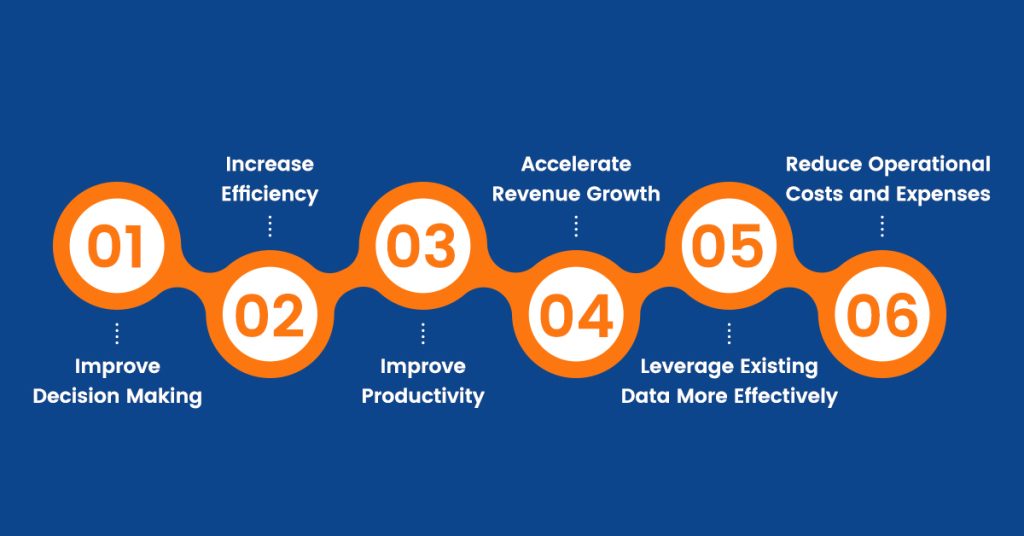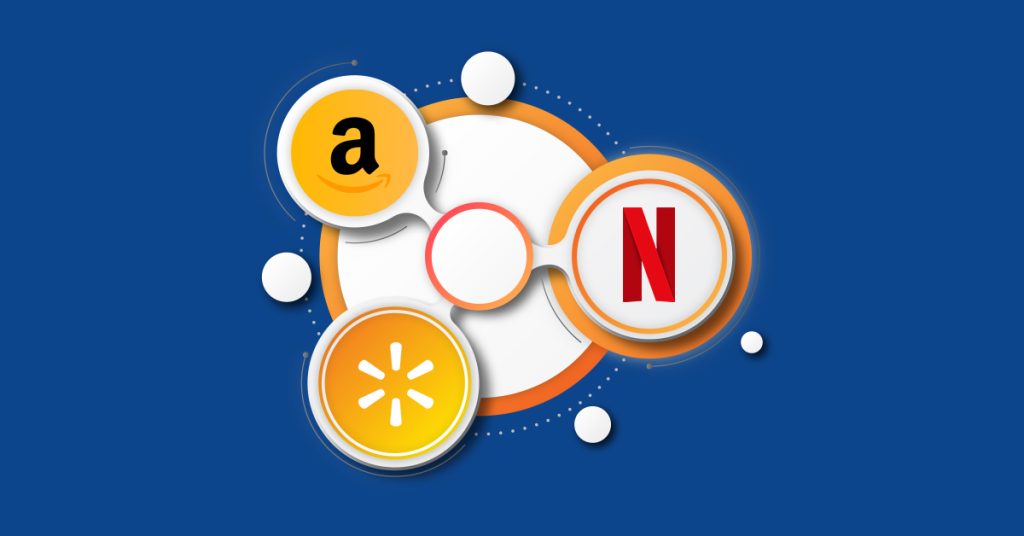
Quick Summary :
Business Intelligence (BI) enables businesses to make informed decisions by analyzing vast amounts of data. It improves efficiency, productivity, and revenue growth while reducing costs. Companies like Walmart, Netflix, and Amazon leverage BI for a competitive edge. The future of BI involves big data, cloud computing, and advanced analytics.
Most businesses are now on the cloud, not just because hosting your data online is cheaper. The cloud is also a powerful tool for analyzing data and making it actionable.
Business intelligence (BI) is a powerful tool for identifying trends in your business and taking proactive steps to improve performance. It can help you identify sales opportunities, plan for future growth, and understand how your customers behave.
But why does BI matter? What does it do for you? This article will explore why BI is essential for modern enterprises.
What is Business Intelligence?
Business intelligence is a broad term that encompasses a lot of different things. It is a way for companies to measure their performance and make better decisions about the future. But it also involves gathering data from all over the place, analyzing it, and presenting it in a way that makes sense to executives and other key decision-makers.
Business intelligence allows them to analyze the points placed. It aims to give managers the information they need to make better decisions. For example, a manager may want to know which products will sell at the current price.
Significance of Business Intelligence In Modern Enterprises
The importance of business intelligence in modern enterprises cannot be denied. Data is the key to driving the business forward, and BI solutions are the tool that helps businesses unlock value from their data.
BI tools have evolved as enterprises have faced more complex needs. Today, they include a range of capabilities that help businesses in various stages of maturity make sense of their data.
The following are some of the ways that BI can help your organization:
-
- Gain Insights Into Your Business
-
- Make Better Decisions
-
- Improve Operational Efficiency
6 Competitive Advantages of Business Intelligence

Business intelligence is essential to help you get ahead of your competition. Here are seven ways BI can give you a competitive advantage :
1. Improve Decision Making
The ability to analyze large volumes of data and present it clearly can help decision-makers make better decisions. They can see patterns in the data that they may not have noticed. This can lead to better customer service, reduced costs, and increased sales. For example, you can use BI software to track sales trends over time to anticipate seasonal changes in customer demand.
2. Increase Efficiency
BI solutions can help you increase efficiency in multiple ways. They can automate manual tasks, reducing error rates and freeing up resources for other projects or tasks.
BI tools also allow real-time analytics and alerts on important events. This can enable you to respond quickly to changing situations and avoid costly mistakes.
Moreover, it helps you gather data from all business areas and provide insights for better decisions. For example, if you want to increase sales but need to know how many customers are buying products at each store, you may save time sending out flyers when more advertising is needed in specific locations.
A BI tool would give you a complete picture of what happens at each location to target advertising dollars where they’re needed most to increase sales.
3. Improve Productivity
BI software allows employees to get more done with less effort. Employees can access relevant data anytime and make better decisions without waiting for someone else to provide them with the information they need for their jobs.
For example, suppose an employee wants to know how many widgets were shipped last week. In that case, they can log into the company’s BI system and see precisely how many were shipped each day of the week, which vendors provided those shipments, and what type of order they were placed under (such as rush shipping).
This saves time and effort because it eliminates the need for employees to track down this information from multiple sources or wait until someone else can provide it.
4. Accelerate Revenue Growth
Business Intelligence helps you better understand your customers, so you can provide them with exactly what they want when they want it. This is especially important in the digital age, where consumers have more choices. By understanding your customers’ needs, you can offer them products or services that meet them, leading to increased sales and revenue growth for your company.
Moreover, business intelligence software lets you see where your company spends money and how much revenue it generates. You can use this information to adjust to increase revenue growth and profitability. For example, if you find that your sales team needs to close more deals, you can take steps to change that behavior.
5. Leverage Existing Data More Effectively
Existing data is everywhere- it is just a matter of finding and using it effectively. BI tools allow you to use existing data to gain insights into your business’s performance today and what trends you should expect in the future. This insight allows you to make more informed decisions about improvements to take advantage of opportunities later.
6. Reduce Operational Costs and Expenses
Another major advantage of BI is its ability to help companies reduce operational costs and expenses by providing them with real-time data that they can use to make better decisions. This helps them avoid costly mistakes and ensures they work on the right tasks at the right time. Moreover, businesses can also help determine how much money they spend on each process and product. It helps them find ways to reduce expenses without affecting quality or customer satisfaction.
Examples of Companies Using Business Intelligence For a Competitive Edge

A lot of companies are using business intelligence for a competitive edge. Business Intelligence (BI) uses technology and software to help analyze information and make better decisions. The following are some examples of companies that have used BI to improve their business:
1. Walmart
Walmart has used BI to make its supply chain more efficient by analyzing data from sales reports and inventory levels. This has helped them improve customer service and cut costs by reducing store stock-outs.
2. Netflix
Netflix uses BI tools to help predict what new movies customers will want to watch next so that they can make recommendations based on those predictions. This helps them keep customers returning to their site, increasing revenue for Netflix and making it easier for them to recommend movies that people like without risking getting them wrong too often. It also helps them get rid of movies that aren’t popular anymore, which saves money on storage space and reduces clutter in their recommendations list for customers who may not know what they want yet but might like something else if they saw it first!
3. Amazon
Amazon has been using its data to create innovative products and services that have changed online shopping. Amazon could predict what customers would buy based on their previous purchases and then offer suggestions for additional items they might be interested in buying. This type of personalized service is now available at many retailers, but it was one of the first companies to implement it at scale.
Future of Business Intelligence
Business intelligence is becoming more critical than ever as companies attempt to sift through the vast amounts of data they collect daily. This information can be used to make better decisions, from product development to marketing efforts. The future of business intelligence is all about big data, cloud computing, and analytics.
BI tools help companies collect, process, and analyze data from various sources, including internal systems, social media, and external vendors. They also provide access to a wide range of analytical tools so that users can create reports for their colleagues and managers.
According to research firm Gartner Inc, the BI market was worth 27.11 billion in 2022 and is projected to grow from USD 29.42 billion in 2023 to USD 54.27 billion by 2030.
Conclusion
BI is not just a passing trend. It is not just one of several analytical tools that you can use.
Businesses that use BI to its fullest—to truly analyze their internal workings—will have a powerful tool in their arsenal.
With BI, businesses can know where they stand and where they’re going. By using analytics and reporting, they will understand what is working, what isn’t, and how to improve. This leads to a better understanding of the customer base, which leads to more satisfied customers. This makes for a dynamic and success-driven company.



